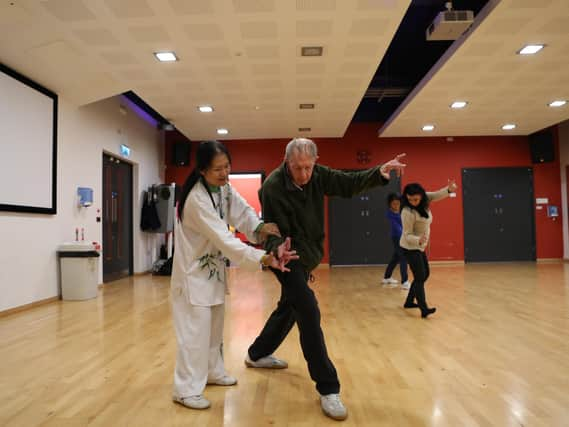'Once you set out on the journey, there is no end' - Preston martial arts teacher explains why tai chi is ideal for everyone


Feixia Yu has been teaching tai chi since the Beijing Olympics, but she only realised its true potential when she took on her role as director of the Confucius Institute at UCLan.
This particular Chinese form of exercise has been around for hundreds of years and was originally practised for defence training.
Advertisement
Hide AdAdvertisement
Hide AdHowever, in more recent years it has been discovered to have many health and wellbeing benefits, such as relieving stress and improving posture and balance.
Feixia said: “I’ve always been interested in tai chi and martial arts.
“Many of us were brought up with this dream of wanting to learn martial arts like the Shaolin monks, but I didn’t really pay much attention to it apart from the usual PE lessons that you have to learn the sets.
“But as I took on this role as director of the Confucius Institute, I became more interested in finding different aspects of the Chinese culture that would have this common value.
Advertisement
Hide AdAdvertisement
Hide Ad“For example tai chi is beneficial for fitness and wellbeing and I thought it would be good to share it with people from other cultural backgrounds.”
Tai chi is based on different sets of exercises which can be adapted to anyone’s physical skills, regardless of their age or mobility.
It includes the five animal play which is the earliest form of medical tai chi created by Chinese physician, Hua Tao.
This particular set is inspired from the actions of different animals such as a tiger, bear, deer, monkey and a bird.
Advertisement
Hide AdAdvertisement
Hide AdIt mirrors flowing animal movements which are gentle on the joints and muscles, combined with deep breathing and relaxation.
Feixia said: “It’s important to focus on breathing and to encourage people to do long, deep and slow breaths to help calm the mind.
“Everyone can do it. The wonderful thing about tai chi is that it’s a low intensity exercise.
“Low intensity means gentle on the body and it’s up to you to say how much you want to do.
“It’s very mindful and meditative in a way.
Advertisement
Hide AdAdvertisement
Hide Ad“With tai chi it’s one of those things where there is no end, once you start the journey you get addicted to it and you want to learn more.”
The five animal play has been prescribed by doctors to people who have anxiety or depression and different sets of tai chi have been recommended to help people recover from an illness or injury.
Feixia advises going to a doctor before starting tai chi to help locate what body part needs to be worked on.
Specifically with the five animal play, some exercises will be suitable on the mind and others will focus on the spine, legs and shoulders.
Advertisement
Hide AdAdvertisement
Hide AdFeixia said: “It could be for balance, which is one of the first motor skills we lose as we age so it’s very important to exercise.
“Tai chi is good for that because you are constantly shifting your weight from one leg to the other.”
A variety of props including a tai chi fan and sticks can be used when exercising in martial arts.
The benefit of using the stick is to force you to open up your shoulders because the stick is an extension of your arms and helps you to focus where the power is going.
Advertisement
Hide AdAdvertisement
Hide AdFeixia said: “Using the stick is like a tool, it helps you to do certain movements such as breathing and massaging acupuncture points, forcing you to use your own body weight to move it.
“At the beginning you are trying to coordinate the lower body and upper body.
“Once you start learning you see the alternation between tension and relaxation with many of the moves.”
Feixia teaches tai chi at the Oasis Faith and Spirituality Centre in Preston on Tuesdays from 6pm. Each session costs £5. Contact [email protected].